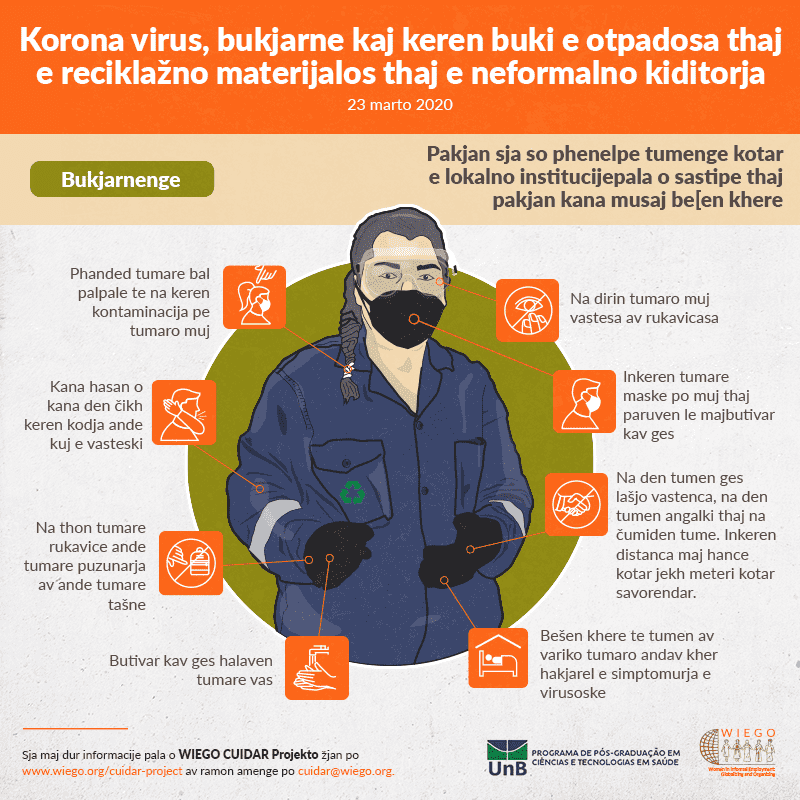April 28 is the World Day for Safety and Health at Work. The need to protect workers who provide essential services has never been greater. WIEGO offers these insights and shareable prevention and information resources.

Many informal workers are continuing to provide critical services during this global pandemic. They are striving to keep their communities fed, informed and more sanitary during the COVID-19 crisis, despite a lack of adequate protection--putting them at additional risk.
WIEGO is working closely with organizations of informal workers and with public health experts to develop and share realistic guidelines for prevention.
Street Vendors and Market Traders

Street vendors are a crucial link to food and basic necessities, especially for the poorest segments of society.
Street vendors, market traders and market porters earn their incomes in public, often crowded spaces. Recent research shows that many have inadequate access to water, sanitation, and hygiene, so telling them to wash their hands is futile unless municipal authorities provide the means to do it.
RESOURCES
Poster: COVID-19 Health Guidelines For Informal Traders
Share these versions on WhatsApp and Twitter: Health Guidelines For Informal Traders
Must-hear interview: WIEGO's Caroline Skinner explains the urgent need to unlock the informal food system — “the system works!” — and calls for countries to provide water and sanitation and to send clear directives to enforcement agencies to stop harassing these essential players in food security. Food Security and Street Vendors during COVID-19
Waste Pickers

Waste pickers/recyclers provide sanitation and solid waste services that contribute to public health, lower landfill costs, and offer an improved environment. For the good of these workers and their communities, governments must make it possible for waste pickers to follow public health guidelines. Income support, access to water/sanitizer and provision of protective gear are crucial right now. So is access to health care and social protections.
- SHAREABLE SAFETY TIPS in multiple languages
In Brazil, WIEGO's Cuidar Project developed this poster to help waste pickers reduce risks. A technical note, Recommendations for the prevention of Coronavirus (COVID-19) among solid waste workers was also developed. Português
Domestic Workers

Domestic workers are on the frontlines of meeting hygiene standards and providing care, including for the sick and elderly. Because their work requires them to be in others’ home—often multiple homes—and to come in close contact with individuals and items that may carry the virus, they are at risk and require workplace protection, or compensation to stay home.
Home-based workers, having lost all their income as markets closed and supply chains seized, have put their skills to work sewing masks, medical gowns, and other gear in multiple regions.
What informal workers need now
- Governments should provide all essential workers with necessary personal protective gear to avoid infection, as well as water or hand sanitizer to reduce spread of disease.
- In informal settlements and slums where many informal workers live and work, basic water and sanitation should be provided.
- All workers, including informal workers and especially essential workers, should have access to health care.
WIEGO Blog: How Cities Can Support Informal Workers: COVID-19 and Beyond - In this blog, Jenna Harvey details workers’ demands that city governments provide them the support they need now, as one step in the necessary process of creating a transformed social contract for the future.
Guidelines and information mean nothing if the working poor do not have the means to follow them. Years of lack of investment in basic infrastructure services in markets have left informal workers ... in dangerous environments.
Health and Safety beyond COVID-19
WIEGO's research into the risks waste pickers face at work led to the development of these safety infographics:
- ACCRA: Market Trader, Street Vendor & Headloader Porter Health & Safety
- ACCRA: Waste Picker Health & Safety
- MINAS GERAIS: Waste Picker Health & Safety
- AHMEDABAD: Home-based Worker Health & Safety
